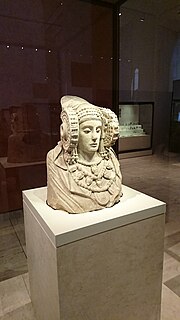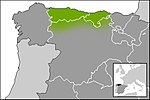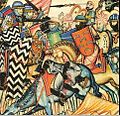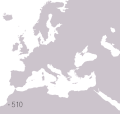The Roman Republic conquered and occupied territories in the Iberian Peninsula that were previously under the control of native Celtic, Iberian, Celtiberian...
180 KB (29,104 words) - 15:35, 19 August 2024
The Muslim conquest of the Iberian Peninsula (Arabic: فَتْحُ الأَنْدَلُس, romanized: fataḥ al-andalus), also known as the Arab conquest of Spain, by the...
40 KB (5,103 words) - 01:07, 23 September 2024
century BCE), through the Roman conquest of the Iberian Peninsula. The Romans founded cities and Romanized some previously existing settlements. Generally...
15 KB (496 words) - 12:04, 25 October 2023
gradually by Latin, following the Roman conquest of the Iberian Peninsula. The Iberian language is unclassified: while the scripts used to write it have...
57 KB (6,149 words) - 17:37, 1 September 2024
The Roman conquest of Britain was the Roman Empire's conquest of most of the island of Britain, which was inhabited by the Celtic Britons. It began in...
41 KB (4,917 words) - 13:10, 4 September 2024
Invasion of Spain can refer to: Roman conquest of the Iberian Peninsula (218–19 BCE), the conquest of modern-day Spain by the Roman Republic Migration...
813 bytes (142 words) - 20:38, 25 November 2022
The Iberians (Latin: Hibērī, from Greek: Ἴβηρες, Iberes) were an ancient people settled in the eastern and southern coasts of the Iberian Peninsula, at...
31 KB (3,752 words) - 12:27, 25 August 2024
Trajan's Dacian Wars (redirect from Roman conquest of Dacia)
between the Roman Empire and Dacia during Emperor Trajan's rule. The conflicts were triggered by the constant Dacian threat on the Danubian province of Moesia...
15 KB (1,691 words) - 03:25, 19 August 2024
Lleida (redirect from History of Lleida)
the Bronze Age period. Until the Roman conquest of the Iberian Peninsula, the area served as a settlement for an Iberian people, the Ilergetes. The town...
35 KB (3,245 words) - 14:01, 17 September 2024
Cantabrian Wars (redirect from The Cantabrian Wars)
Cantabricum et Asturicum), were the final stage of the two-century long Roman conquest of Hispania, in what today are the provinces of Cantabria, Asturias and...
17 KB (1,951 words) - 12:58, 3 September 2024
derives from the pre-Roman inhabitants of the Iberian Peninsula who were deeply Romanized after the conquest of the region by the ancient Romans: Pre-Indo-European...
80 KB (7,496 words) - 16:34, 18 September 2024
Spain (redirect from Kingdom of the Spains)
antiquity, the Iberian Peninsula was inhabited by Celts, Iberians, and other pre-Roman peoples. With the Roman conquest of the Iberian Peninsula, the province...
245 KB (23,187 words) - 03:34, 27 September 2024
Numantine War (category Roman conquest of the Iberian Peninsula)
After open war reignited in 143, Rome sent a series of generals to the Iberian peninsula to deal with the Numantines. In that year, Quintus Caecilius Metellus...
6 KB (563 words) - 01:21, 9 August 2024
Hispania (redirect from Spain in the Roman era)
(Ancient Greek: Ἱσπανία, romanized: Hispanía; Latin: Hispānia [hɪsˈpaːnia]) was the Roman name for the Iberian Peninsula. Under the Roman Republic, Hispania...
44 KB (5,247 words) - 13:26, 23 September 2024
The Iberian horse is a designation given to a number of horse breeds native to the Iberian Peninsula. At present, some breeds are officially recognized...
9 KB (975 words) - 02:37, 25 August 2024
the summer of 133. The siege of Numantia was recorded by several Roman historians that admired the sense of freedom of the ancient Iberians and acknowledged...
6 KB (623 words) - 13:09, 17 July 2024
BC. From 197 BC, the Roman Republic divided its conquests in the south and east of the Iberian Peninsula into two provinces: Hispania Citerior and Hispania...
71 KB (8,060 words) - 20:38, 8 September 2024
The Iberian Peninsula (IPA: /aɪˈbɪəriən/), also known as Iberia, is a peninsula in south-western Europe. Separated from the rest of the European landmass...
127 KB (14,024 words) - 20:50, 25 September 2024
Reconquista (redirect from Christian Reconquest of the Iberian Peninsula)
against the Muslim kingdoms following the Muslim conquest of the Iberian Peninsula by the Umayyad Caliphate, culminating in the reign of the Catholic...
132 KB (15,383 words) - 20:54, 25 September 2024
Northern Spain to the Caucasus Mountains; Iberian, which was spoken by most of Spain prior to the Roman conquest of the Iberian peninsula; Libyan, which...
15 KB (1,551 words) - 12:33, 3 September 2024
The Roman–Parthian Wars (54 BC – 217 AD) were a series of conflicts between the Parthian Empire and the Roman Republic and Roman Empire. It was the first...
24 KB (2,707 words) - 12:54, 20 September 2024
Lusitanian War (redirect from War of Fire)
colonies in the Mediterranean Coast of the Iberian Peninsula. This marked the first incursion of the Roman Republic into the peninsula and possibly the first...
16 KB (1,865 words) - 14:38, 22 September 2024
Numantia (category Roman conquest of the Iberian Peninsula)
by several Roman historians who admired the sense of freedom of the ancient Iberians and acknowledged their fighting skills against the Roman legions. Miguel...
9 KB (884 words) - 17:38, 6 November 2023
Mutiny at Sucro (category Roman conquest of the Iberian Peninsula)
maintained the loyalty of his troops by ensuring they were properly paid and supplied. Ancient writers including the Greek historian Polybius and the Roman historian...
6 KB (316 words) - 14:42, 2 September 2024
Second Celtiberian War (category Roman conquest of the Iberian Peninsula)
can name the Pellendones, the Arevaci, the Lusones, the Titti and the Belli) against the presence of the Romans in Hispania. In 154 BC, the Roman senate...
19 KB (2,987 words) - 22:07, 23 July 2024
Ancient Rome (redirect from Capitals of the Roman Empire)
is the Roman civilisation from the founding of the Italian city of Rome in the 8th century BC to the collapse of the Western Roman Empire in the 5th...
189 KB (21,524 words) - 06:15, 24 September 2024
The siege of Masada was one of the final events in the First Jewish–Roman War, occurring from 72 to 73 CE on and around a hilltop in present-day Israel...
21 KB (2,091 words) - 12:26, 25 September 2024
Arouca, Portugal (category Pages using the Phonos extension)
archaeological excavations, it is known that the area was settled late in the Roman conquest of the Iberian Peninsula (due to its distance from coastal and north–south...
12 KB (1,195 words) - 19:01, 27 September 2024
The Muslim conquest of the Maghreb (Arabic: فَتْحُ اَلْمَغْرِب, romanized: Fath al-Maghrib, lit. 'Conquest of the West') or Arab conquest of North Africa...
47 KB (5,748 words) - 17:46, 11 September 2024
heidelbergensis. The Roman conquest of the Iberian Peninsula, which lasted almost two centuries, led to the establishment of the provinces of Lusitania in the south...
156 KB (19,074 words) - 15:57, 17 September 2024






















